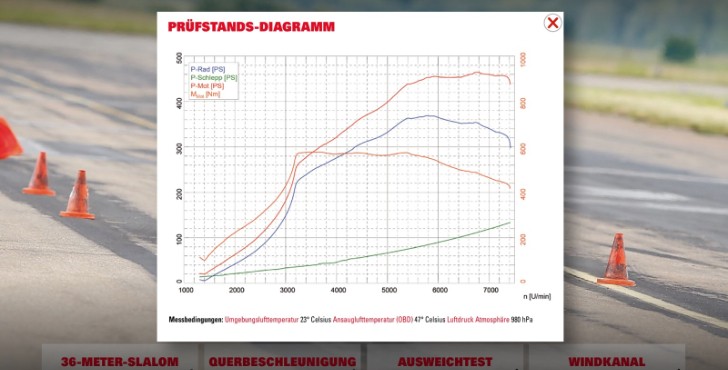As we expected, the numbers the new S55 engine posts on the dyno in the real world are a bit off from what BMW is claiming but to most people, that’s good news.
Therefore, when we learned what the new 3-liter biturbo unit from the Motorsport division is capable of, we weren’t exactly surprised. As we’ve come to expect from the Bavarians, the cars they are making are posting seriously bigger numbers than advertised.
According to the official specs released by BMW, the new M3 and M4 models have 431 HP and 550 Nm (406 lb-ft) of torque coming out of the engine bay. However, auto magazine Sport Auto, put the F82 M4 on a dyno and got different numbers.
Their result showed that the engine actually makes around 465 HP between 6,000 and 7,000 RPM and up to 577 Nm (426 lb-ft) of torque between 3,200 and 5,800 RPM. Therefore, there’s a roughly 35 HP and 30 Nm difference at play here. Not huge, compared to other models.
For example, the F10 M5 was rated at 620 HP and 720 Nm of torque by various independent tests, 60 HP and 40 Nm more than what BMW is claiming for the S63 4.4-liter twinturbo engine.
What’s even more interesting is how the torque build-up takes place. Unlike the graphs BMW released, this one shows a rapid increase just above 3,000 RPM, where the torque goes from 400 Nm to 577 in just 200 RPM. We didn’t drive the M4 yet but something tells us that right in this spot you’ll fell the turbos kicking in really hard.
The HP delivery, on the other hand, looks a lot better and more linear, rising steadily from 1,200 RPM to above 7,000 where the redline is. No worries there.
So, what does that tell us? First of all, if you were praying for a pedal response similar to the one you’d get from a naturally aspirated engine, you’d better think again. Those turbos will be felt throughout the rev range and you’ll know it, no matter what.
Now, that could be looked at as both bad and good. If the turbo lag is indeed minimal, it shouldn’t be all that bad, after all. Sure, the torque will take you by surprise just above 3,000 RPM but for some people (most of them, actually) that’s just going to be more fun and not a problem. For those die-hard fans of the old naturally aspirated units, it will be a sacrilege that turns the S55 engine into something not worth a second look. To each his own.
According to the official specs released by BMW, the new M3 and M4 models have 431 HP and 550 Nm (406 lb-ft) of torque coming out of the engine bay. However, auto magazine Sport Auto, put the F82 M4 on a dyno and got different numbers.
Their result showed that the engine actually makes around 465 HP between 6,000 and 7,000 RPM and up to 577 Nm (426 lb-ft) of torque between 3,200 and 5,800 RPM. Therefore, there’s a roughly 35 HP and 30 Nm difference at play here. Not huge, compared to other models.
For example, the F10 M5 was rated at 620 HP and 720 Nm of torque by various independent tests, 60 HP and 40 Nm more than what BMW is claiming for the S63 4.4-liter twinturbo engine.
What’s even more interesting is how the torque build-up takes place. Unlike the graphs BMW released, this one shows a rapid increase just above 3,000 RPM, where the torque goes from 400 Nm to 577 in just 200 RPM. We didn’t drive the M4 yet but something tells us that right in this spot you’ll fell the turbos kicking in really hard.
The HP delivery, on the other hand, looks a lot better and more linear, rising steadily from 1,200 RPM to above 7,000 where the redline is. No worries there.
So, what does that tell us? First of all, if you were praying for a pedal response similar to the one you’d get from a naturally aspirated engine, you’d better think again. Those turbos will be felt throughout the rev range and you’ll know it, no matter what.
Now, that could be looked at as both bad and good. If the turbo lag is indeed minimal, it shouldn’t be all that bad, after all. Sure, the torque will take you by surprise just above 3,000 RPM but for some people (most of them, actually) that’s just going to be more fun and not a problem. For those die-hard fans of the old naturally aspirated units, it will be a sacrilege that turns the S55 engine into something not worth a second look. To each his own.
